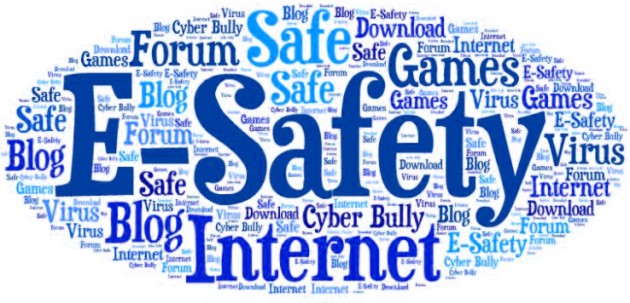 More commonly known as e-safety and cyberbullying, Ofsted guidelines for schools updated in September 2015 recommend the use of the terms online safety and online bullying, to highlight the widening range of issues linked to safety online. (SWGfL, 2015)
More commonly known as e-safety and cyberbullying, Ofsted guidelines for schools updated in September 2015 recommend the use of the terms online safety and online bullying, to highlight the widening range of issues linked to safety online. (SWGfL, 2015)
For the generation of young people who are ‘digital natives’ ‘it is crucial to note that their physical and emotional safety and their well-being extend beyond those dangers which are visible and tangible in the ‘real world’ (Giant, 2013, p. 12)
It is an issue that concerns many parents and educators, especially as so many children have access to the internet and more and more of our lives are spent online. Cyberbullying can be very damaging for young people as it is not something they can get away from and it can lead to problems such as depression.
” Those who work with young people have little doubt that the biggest threat to their emotional health comes to them via social media, the internet and instant messages.” (TES, 2015)
Ofsted also published the results of a survey on online safety, drawn from their inspection data. This shows that there is a lot of variation in how the teaching of online safety is approached and many areas for improvement (UK Safer Internet Centre, 2015)
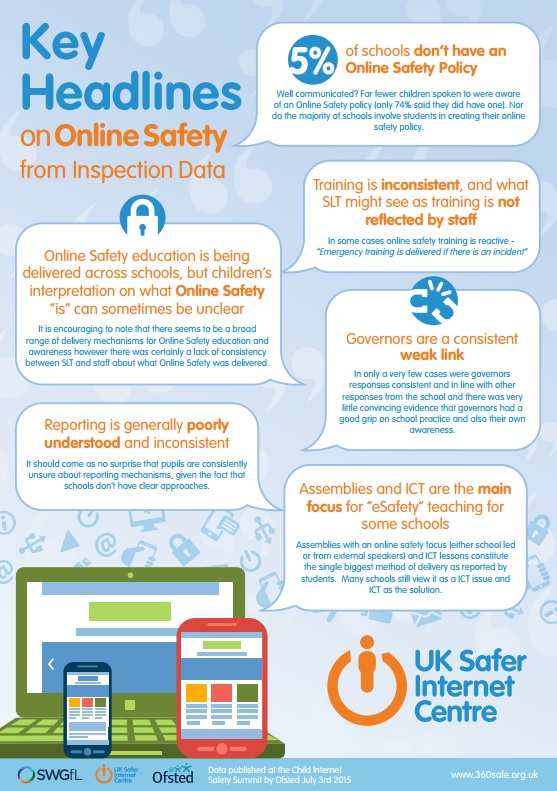
So what exactly does online safety mean and how can we prevent children becoming a victim of or taking part in online bullying?
For some people it is the technology itself that is the problem so a common reaction is to block websites such as Facebook and Youtube from school networks. However, this does not address the fact that children will have access to these once off school premises (TES, 2014)
This video from Newsround, aimed at primary children, explains that the internet is just like the real world in that there are safe places and unsafe places and good people and bad people. It explains that the issue is not the technology but the way people use the technology, therefore highlighting the importance of education in teaching children to recognize when something might be dangerous and to make the right choices.
The following videos look at the issue of online grooming and are aimed at girls in upper primary and lower secondary, although they could also be useful for stimulating discussion about online safety with mixed-sex groups and older age groups.
Yet government policy (the National Curriculum) specifies that children at Key Stage 1 Level (lower primary) should be ale to:
‘use technology safely and respectfully, keeping personal information private; identify where to go for help and support when they have concerns about content or contact on the internet or other online technologies.’
How can we make e-safety meaningful for younger children?
Childnet has produced a guide offering ideas for how the National Curriculum requirements can be met with activities suitable for each Key Stage.
http://www.childnet.com/resources/esafety-and-computing
The following wordless video could prove useful to introduce this idea to very young children and encourage them to ask adults for help if they feel uncomfortable or uncertain about anything they come across online.
There are a lot of resources available online with tips for online safety presented in a child-friendly format.
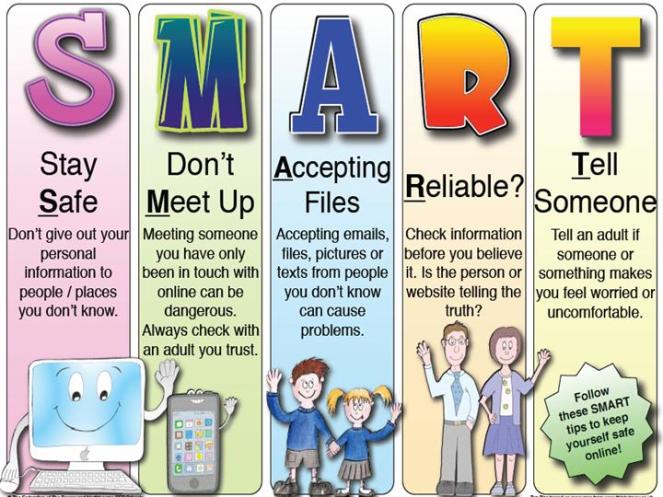
Cyberbullying / Online Bullying

A survey from 2013 (Ditch the Label) resulted in some of these alarming statistics: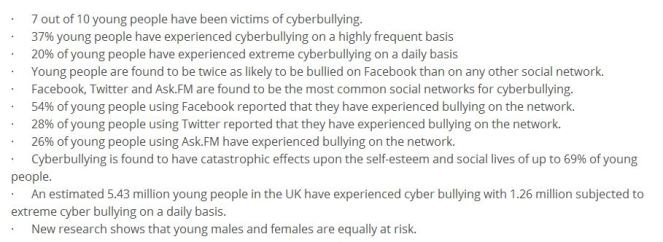
In 2015, it can be imagined, these statistics may have become even more disturbing. A recent article in the Medical News Today (2015) reported that 23% was the average number of children who had been bullied online – this was taken from looking at all the studies done so far showing rates of between 4.8% and 73.5%. They also found a strong link between cyberbullying and depression, with many children who took part in the survey reporting that they felt nothing could be done to stop it.
Further cyberbullying statistics
Advice for teachers about tackling cyberbullying
Advice for young people about tackling cyberbullying
Advice for parents about tackling cyberbullying
It is important to remember that cyberbullying can affect anyone – there are countless stories of families being scammed out of holidays, employees losing their jobs after having their facebook hacked, etc (See further reading section below for links to some of these articles)
Online safety is something which affects us all and it is our responsibility to educate ourselves and our children about what it means to be safe online.
References
Ditch the Label (2013) ‘The Cyberbullying Report’ Available from: http://www.ditchthelabel.org/the-cyber-bullying-survey-2013/ (Accessed 28/11/15)
Giant, N. (2013) E-Safety for the i-generation: Combating the misuse and abuse of technology in schools, Jessica Kingsley Publishers: London
Medical News Today (2015) ‘Analysis finds 23% of children are victims of cyberbullying’ Available at: http://www.medicalnewstoday.com/articles/295740.php (Accessed 29/11/15)
SWGfL (2015) Making sense of the new online safety standards. Available at: http://swgfl.org.uk/news/News/online-safety/Making-Sense-of-the-New-Online-Safety-Standards (Accessed 27/11/15)
TES (2014) ‘Why Technophobia’ is the real problem’ Availale from: https://www.tes.com/news/tes-archive/tes-publication/why-technophobia-real-enemy (Accessed 25/11/15 Subscription required)
TES (2015) ‘The time for action on mental health is now’ Print edition No. 5174 Published 27/11/15
UK Safer Internet Centre (2015) ‘Ofsted reveals new ‘Online Safety in Schools’ Survey’, http://www.saferinternet.org.uk/news/ofsted-reveals-new-online-safety-in-schools-survey
Further ideas and resources
Join in Internet Safety Day by organising activities at your school
http://www.saferinternet.org.uk/safer-internet-day/2016
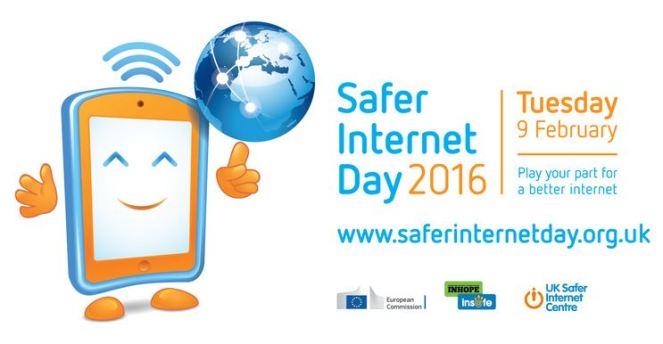
Join in with Stop Cyberbullying Day

Join a free session on internet safety
http://www.saferinternet.org.uk/advice-and-resources/teachers-and-professionals
Do a free e-safety audit for your school – is it as safe as you think?
Books for teaching children about online safety (some free to download when accessed on 19/11/15) http://www.amazon.co.uk/-/e/B00N4ZOP6I/ref=dp_byline_sr_ebooks_1?ie=UTF8&text=Hannah+Whaley&search-alias=digital-text&field-author=Hannah+Whaley&sort=relevancerank
Online safety for children with Autism
Further reading on online safety and online bullying
http://www.safetynetkids.org.uk/personal-safety/staying-safe-online/
http://www.childnet.com/resources/esafety-and-computing
http://www.lgfl.net/esafety/Pages/safeguarding.aspx
http://counterextremism.lgfl.org.uk/
http://www.saferinternet.org.uk/
http://www.actionfraud.police.uk/news
http://www.bbc.co.uk/programmes/articles/4X2ZXXtVrP9Tl0fcdfbtnND/further-information
http://specialreports.dailydot.com/how-to-destroy-an-american-family

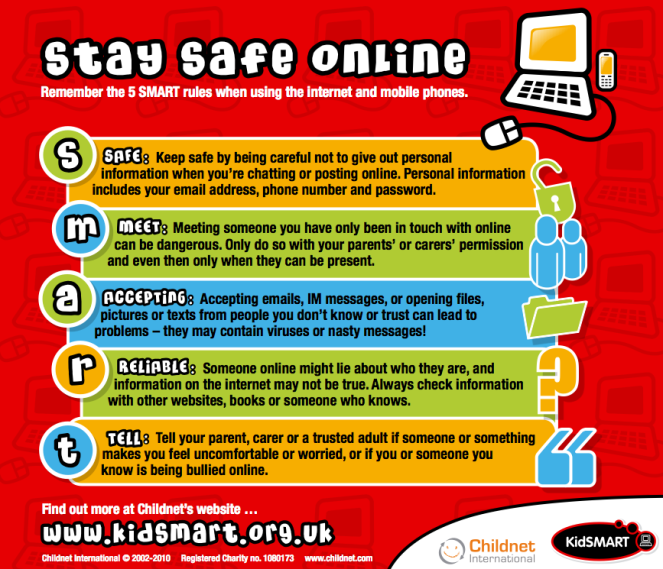
One thought on “Online safety and online bullying”